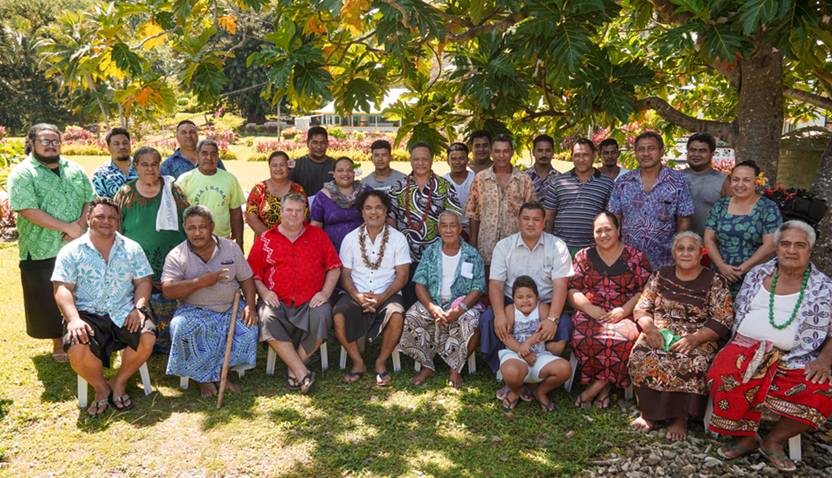Apolima Island could provide a model for rat eradication efforts across the Pacific, according to Mr. Seumaloisalafai Afele Faiilagi, Assistant Chief Executive Officer for the Ministry of Natural Resources and Environment (MNRE).
Apolima Island could become a model for eradicating rats on inhabited islands if it becomes rat-free, and that could be big news for Samoa and a success story in the Pacific. However, we are still a long way away from that, he said.
Mr. Faiilagi was speaking at a special consultation with the Apolima Island community on Thursday 25 August, held in partnership with the Secretariat of the Pacific Regional Environment Programme (SPREP) and the Pacific Regional Invasive Species Management Support Service (PRISMSS).
While there have been a number of successful rat eradication projects on uninhabited islands across the Pacific, efforts are now underway to replicate these successes on smaller inhabited offshore islands such as Apolima.
The main aim of the consultation was to seek consent from the community for completing a feasibility study for the eradication of rats on Apolima Island and developing an operational plan which will be led by Samoa’s MNRE and its PRISMSS partner, the New Zealand Department of Conservation (NZDOC).

Twelve staff members from MNRE and SPREP travelled to Apolima Island for the community consultation which resulted in the community providing its full approval and support for the implementation of the project. If successful, the project could provide a number of direct benefits such as reducing damage to food supplies and buildings as well as increasing the abundance of native bird life.
Rats have been a problem in this island for so many years now, and we thank the government for considering our small, isolated island to be part of this project, said village representative and Mayor, Mr. Leala Solo.
Mr. David Moverley, SPREP’s Invasive Species Adviser, said that recent research has shown that eradicating rats can help to restore the natural resilience of island ecosystems to the increasing impacts of climate change.
Recent research in Fiji and the Indian Ocean shows that eradicating rats can help save threatened coral reefs by helping to restore seabird populations. The guano (faeces of seabirds) increases the levels of nutrients or nitrogen which increases the health of the reefs and their resilience to impacts such as coral bleaching and cyclones. These studies showed that the number of fish on coral reefs next to an island of seabirds was 50 percent high than the island with rats,”he said.
We already know that rats cause a multitude of problems for the Pacific islands. They eat turtle hatchlings, bird eggs and young chicks, often driving the birds towards extinction along with insects, lizards, and the seeds of native plants, all of which reduce ecosystem resilience. Rats also eat crops, reducing food security and affect human health through the spread of disease, he said.
This month a new study was published in “Scientific Reports” showing that eradicating rats, and other invasive animals from islands is one of the most effective tools for restoring the resilience of natural island ecosystems.
For example, in 2011, the removal of rats from the uninhabited Palmyra Atoll in the mid-Pacific, had a dramatic impact on its ecosystems including the recovery of its coral reefs, substantial increases in two previously undocumented crab species, and a 5,000% increase in the germination of native plant seedlings.
But Mr. Moverley says the success of rat eradication efforts on inhabited islands like Apolima will depend on the engagement, awareness and support of local communities. The Apolima consultation was immediately followed by a three-day social survey, completed on Saturday, 27 August, which was carried out by SPREP and University of Newcastle (UoN) PhD researcher, Mr. William Young, and supported by MNRE staff.
Mr. Young says that while we already know that invasive predators and weed are reducing the resilience of ecosystems and communities, more research is needed to understand how Pacific communities perceive the relationships between invasive species and the impacts of climate change.
The results of three-day social survey will help to inform the feasibility of managing invasive species on the island and understand how invasive species management can be strengthened through local community involvement and in consideration of social diversity and inclusivity, he said.
Mr. Young said the social survey had been designed to engage various groups such as women, men, youth, those living with disabilities and marginalised groups present in our local Pacific Island communities to try and ensure a more holistic and inclusive approach to managing invasive species.
The consultation and social survey work on Apolima is being supported by NZDOC through the New Zealand Ministry of Foreign Affairs and Trade (MFAT) funded project Managing Invasive Species for Climate Change Adaptation in the Pacific (MISCCAP).
For more information, please contact David Moverley, [email protected]
